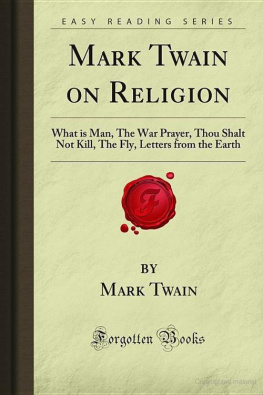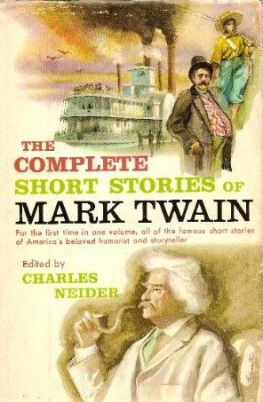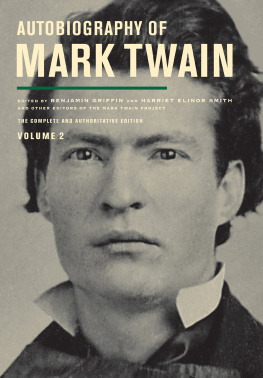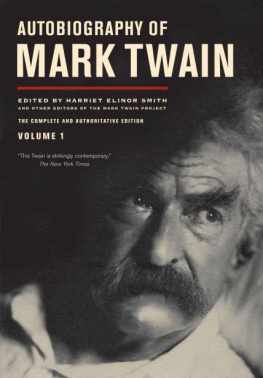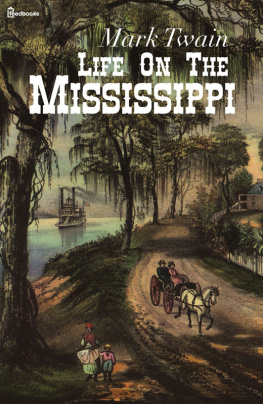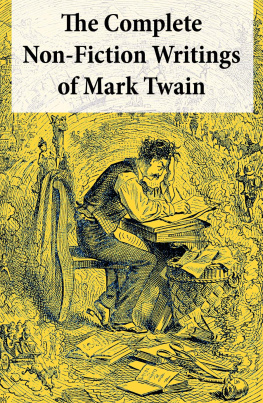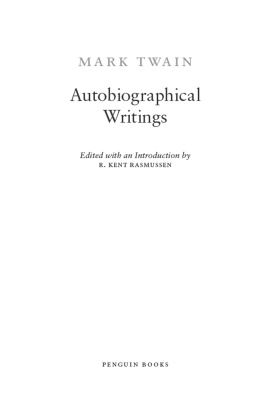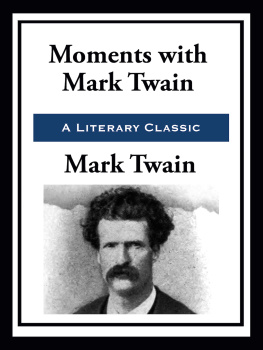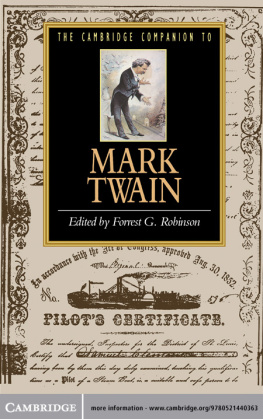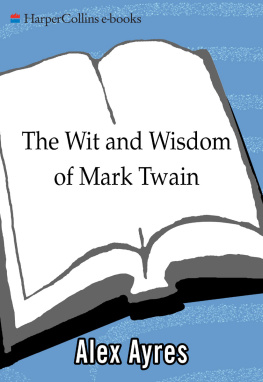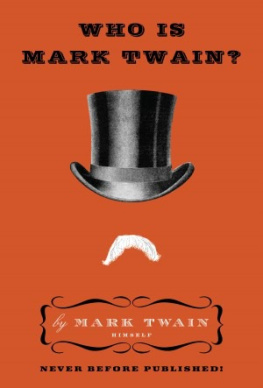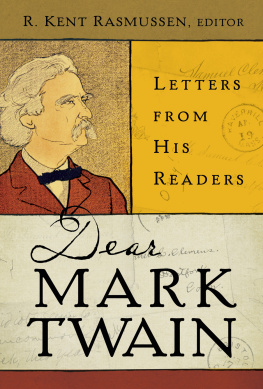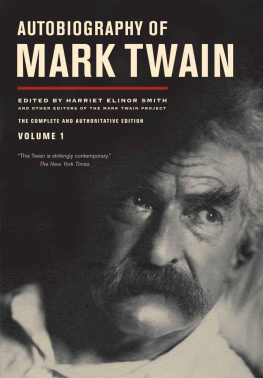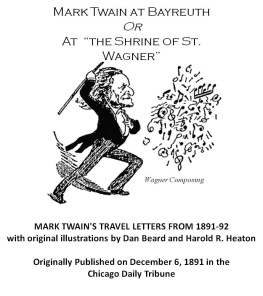Table of Contents
Letters From The Earth
Mark Twain
Copyright 1938-1962
Standard Book Number: 0060803312
Contents
Preface by Henry Nash Smith
Letters From The Earth
Papers of the Adam Family
I Extract From Methuselah's Diary
II A Later Extract From Methuselah's Diary
III Extract From Eve's Autobiography
IV Passage From Eve's Autobiography
V The World In The Year 920 After Creation
VI Two Fragments From A Suppressed Book Called
"Glances At History" or "Outlines of History"
VII Extract From Shem's Diary of 920 A.C.
Letter To The Earth
A Cat-Tale
Cooper's Prose Style
Official Report To The I.I.A.S.
The Gorky Incident
Simplified Spelling
Something About Repetance
From An English Notebook
I The Albert Memorial
II Old Saint Paul's
III The British Museum
From The Manuscript of "A Tramp Abroad": The French And The Comanches From An Unfinished Burlesque of Books On Etiquette
I At The Funeral
II At A Fire
III Visiting Cards
The Damned Human Race
I Was The World Made For Man?
II In The Animal's Court
III Zola's "La Terre"
IV The Intelligence of God
V The Lowest Animal
The Great Dark
Editor's Notes
Preface
In his will Mark Twain directed the Trustees of his Estate to confer with his daughter Clara and Albert B. Paine, his biographer, concerning the administration of his "literary productions." Paine served as literary executor from 1910, when Mark Twain died, until his own death in 1937. During this period he published his three-volume biography, two volumes of letters, and a half-dozen other books drawn from the Mark Twain Papers. Shortly after Paine's death Harper & Brothers recommended to the Trustees that the late Bernard DeVoto, author of Mark Twain's America (1932) and at that time editor of The Saturday Review of Literature, should be asked to take over the task of preparing for publication further material selected from the thousands of pages of unpublished writings by Mark Twain.
DeVoto recommended that three volumes should be brought out: (1) selections from the Autobiographical Dictation to supplement those edited by Paine; (2) a volume of letters; and (3) a collection of sketches and other short pieces. He began work at once on the third item, and in March, 1939, submitted to the Trustees the manuscript of Letters from the Earth, "ready for the printer." But when Clara Clemens read the manuscript she objected to the publication of certain parts of it on the ground that they presented a distorted view of her father's ideas and attitudes.
The project was accordingly dropped, and the work has lain unpublished for more than twenty years in the successive depositories of the Mark Twain Papers, at Harvard, the Huntington Library, and the University of California, Berkeley.
During these two decades a long series of scholarly and critical studies -- including DeVoto's own authoritative Mark Twain at Work (1942) -- has demonstrated that the celebrated humorist was also a great artist. He now belongs beyond question among the major American writers. Since 1960, the fiftieth anniversary of Mark Twain's death, at least a dozen books about him have been published. In this abundance of knowledge and interpretation all his writings can be allowed to speak for themselves, and Clara Clemens has withdrawn her objections to the publication of Letters from the Earth. The book is now presented as DeVoto edited it in 1939, with only one or two minor changes in his editorial comments to take account of subsequent events.
The volume falls into two main parts: a first section, comprising "Letters from the Earth,"
"Papers of the Adam Family," and "Letter to the Earth," that exhibits the astonishingly inventive play of Mark Twain's imagination about Biblical themes, or lunges out in satire of the world he lived in; and a more miscellaneous second section, containing DeVoto's selections from the remaining unpublished manuscripts in the Mark Twain Papers. These shorter pieces were written at intervals during four decades of Mark Twain's career and range in mood from a whimsical tale about cats he improvised for his children to the nightmare sea voyage of "The Great Dark." Several of them have been published separately since 1939, as is indicated in the Bibliographical Note, but they are included here in order to preserve the integrity of DeVoto's editorial intention.
For some of the items in the collection DeVoto provided explanatory comments, which are printed in italics; He also wrote notes to be placed at the back of the book, mainly but not exclusively about problems of dating. His occasional footnotes are signed with his initials ("B.
DV.") to distinguish them from Mark Twain's footnotes, which are labeled "M.T." It should be kept in mind that since Mark Twain did not prepare these manuscripts for the press, they contain minor errors and inconsistencies of form which DeVoto corrected in order to produce a readable text.
Mrs. Bernard DeVoto has kindly given her consent to the publication of what is in a double sense a posthumous work.
HENRY
NASH
SMITH
Berkeley
Literary
Editor
March, 1962
of the Mark Twain Papers
Letters from the Earth
The Creator sat upon the throne, thinking. Behind him stretched the illimitable continent of heaven, steeped in a glory of light and color; before him rose the black night of Space, like a wall. His mighty bulk towered rugged and mountain-like into the zenith, and His divine head blazed there like a distant sun. At His feet stood three colossal figures, diminished to extinction, almost, by contrast -- archangels -- their heads level with His ankle-bone.
When the Creator had finished thinking, He said, "I have thought. Behold!"
He lifted His hand, and from it burst a fountain-spray of fire, a million stupendous suns, which clove the blackness and soared, away and away and away, diminishing in magnitude and intensity as they pierced the far frontiers of Space, until at last they were but as diamond nailheads sparkling under the domed vast roof of the universe.
At the end of an hour the Grand Council was dismissed.
They left the Presence impressed and thoughtful, and retired to a private place, where they might talk with freedom. None of the three seemed to want to begin, though all wanted somebody to do it. Each was burning to discuss the great event, but would prefer not to commit himself till he should know how the others regarded it. So there was some aimless and halting conversation about matters of no consequence, and this dragged tediously along, arriving nowhere, until at last the archangel Satan gathered his courage together -- of which he had a very good supply -- and broke ground. He said:
"We know what we are here to talk about, my lords, and we may as well put pretense aside, and begin. If this is the opinion of the Council --"
"It is, it is!" said Gabriel and Michael, gratefully interrupting.
"Very well, then, let us proceed. We have witnessed a wonderful thing; as to that, we are necessarily agreed. As to the value of it -- if it has any -- that is a matter which does not personally concern us. We can have as many opinions about it as we like, and that is our limit. We have no vote. I think Space was well enough, just as it was, and useful, too. Cold and dark -- a restful place, now and then, after a season of the overdelicate climate and trying splendors of heaven. But these are details of no considerable moment; the new feature, the immense feature, is -- what, gentlemen?"
"The invention and introduction of automatic, unsupervised, self-regulating

